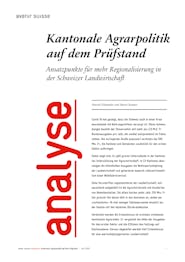Covid-19 has demonstrated that Switzerland has sufficient food supplies, even in a crisis. Most of the time, the media debate on agricultural policy focuses on the CHF 3.9 billion spent by the federal government. This new study by Patrick Dümmler and Mario Bonato is the first in Switzerland to look into the additional CHF 500 million the cantons and municipalities spend on the primary sector. What they find is that there are considerable regional differences in the way the cantons implement agricultural policy. While in the most generous canton (Geneva), additional taxpayers’ money spent on farming comes to 58 percent of federal expenditure, in the thriftiest canton, Bern, the figure is “only” 8 percent.
There are also significant differences in the way the estimated 4,000 pages of regulations governing the Swiss agricultural sector are interpreted. The costs of the “farming bureaucracy” come to CHF 250 million for Switzerland as a whole. The FTEs devoted to agricultural red tape in the “leanest” canton (St. Gallen) are 18 times less than in the canton with the highest costs of farming administration (Geneva).
Avenir Suisse is also making the condensed findings available as an online tool in the form of the first cantonal farming index. The index compares expenditure on the agricultural sector and the efficiency of implementation at the cantonal level.
The agricultural index also shows the following: In 23 cantons, tax-funded, public spending exceeds the net value added of the agricultural sector, which in macroeconomic terms leads to a loss of prosperity all over Switzerland. On the basis of these findings, the authors of the study have formulated five insights with implications for the development of Swiss agricultural policy going forward:
1. Instead of centralized rules from central federal government, the regions need more powers and authority when it comes to implementing agricultural policy. This way local opportunities can be identified more easily, and not negated by false incentives at the federal level.
2. Agriculture’s positive contribution to the common good, for example preservation of the countryside, should continue to be compensated, but transfers to maintain structures should be discontinued.
3. Swiss farmers have to contend with too many rules. They need more entrepreneurial freedom and should have their administrative burden reduced.
4. Trimming down the regulations on agriculture could also reduce the administrative work for the cantons and enable them to significantly reduce the personnel resources tied up in cantonal agricultural administration.
5. From an economic perspective, food production is not always the most appropriate way of preserving the landscape. Cultivation methods should be chosen to yield the same results (in terms of the landscape) at a lower cost to taxpayers.





